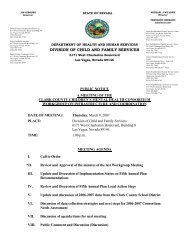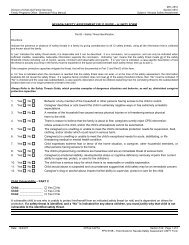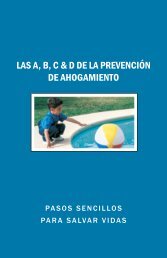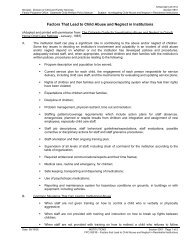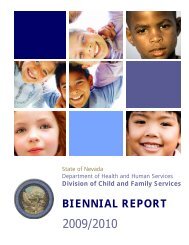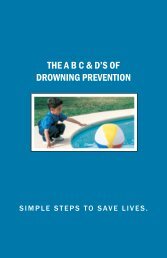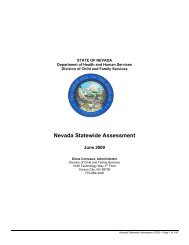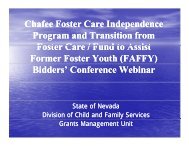STATE OF NEVADA - Division of Child and Family Services
STATE OF NEVADA - Division of Child and Family Services
STATE OF NEVADA - Division of Child and Family Services
Create successful ePaper yourself
Turn your PDF publications into a flip-book with our unique Google optimized e-Paper software.
A third objective for this item is that the State, through the collaboration with the Training Management Team <strong>and</strong> use <strong>of</strong><br />
the Nevada Partnership for Training Reports System, will enhance reports to ensure that all staff receives the required<br />
On-Line or Specialty Core Training within the required timeframes, or to ensure that an appropriate remediation plan is in<br />
place with the <strong>Child</strong> Welfare Agencies. In an effort to address the need for more specialized training for existing workers<br />
<strong>and</strong> remediation needed for both new <strong>and</strong> existing workers, DCFS contracted with UNLV to develop an Intermediate Core<br />
series when New Worker Core Training could not be delivered due to the CCDFS hiring freeze in the third <strong>and</strong> fourth<br />
quarters <strong>of</strong> this fiscal year. One <strong>of</strong> the goals <strong>of</strong> this training series is to enhance the capacity <strong>of</strong> child welfare staff to<br />
effectively engage children, youth <strong>and</strong> families in case decision making. It is the NPT’s position that the New Worker Core<br />
curriculum, specifically the first two modules, is a solid basis for this type <strong>of</strong> family engagement training, <strong>and</strong> therefore the<br />
competencies <strong>of</strong> New Worker Core will help create a framework for Intermediate Core. Moreover, the family engagement<br />
principles in Nevada’s New Worker Core overlap with the core principles found in the National Resource Center for<br />
Permanency <strong>and</strong> <strong>Family</strong> Connections <strong>Family</strong> Engagement Web-Based Practice Tool Kit.<br />
Thus, UNLV started a process with the three child welfare agencies to develop competencies for training existing staff. As<br />
part <strong>of</strong> this process, UNLV surveyed lead caseworkers, supervisors <strong>and</strong> managers regarding the competencies found in<br />
the New Worker Core curriculum to determine their relevance in the development <strong>of</strong> Intermediate Core. An electronic<br />
survey was sent to specific contacts at the three child welfare agencies in March 2010 to distribute within their respective<br />
organizations. There were a total <strong>of</strong> 184 responses to the survey (131 CCDFS, 31 WCDSS, <strong>and</strong> 21 DCFS-Rural). Based<br />
on feedback from the TMT, those competencies that were rated as most important or relevant in the survey would serve<br />
as a platform for this level <strong>of</strong> training, <strong>and</strong> the delivery <strong>of</strong> this training would be designed to be more case-practice oriented<br />
as opposed to lecture. The University partner(s) have analyzed the data from the survey <strong>and</strong> presented<br />
recommendations based on the findings in May 2010 to the TMT partners. Upon approval <strong>of</strong> the competencies <strong>of</strong><br />
Intermediate Core by the TMT <strong>and</strong> DMG, curriculum <strong>and</strong> evaluation instruments will be developed. Once final approval<br />
has been given, protocols <strong>and</strong> any necessary forms will be developed in preparation for delivering the training. At this<br />
time the plan for delivering Intermediate Core will be initiated by the UNLV training team <strong>and</strong> piloted in the southern region<br />
for Clark County existing staff in the first quarter <strong>of</strong> SFY 2011, followed by a pilot in the North by UNR starting in the third<br />
quarter <strong>of</strong> SFY 2011.<br />
Item 34: Foster <strong>and</strong> adoptive parent training<br />
Goal: The State will ensure that training for current or prospective foster parents, adoptive parents, <strong>and</strong> staff <strong>of</strong> Statelicensed<br />
or State-approved facilities that care for children receiving foster care or adoption assistance under title IV-E is<br />
provided in accordance with statewide policy <strong>and</strong> federal st<strong>and</strong>ards.<br />
To achieve this goal, there are several objectives to ensure that training for current or prospective foster <strong>and</strong> adoptive<br />
parents <strong>and</strong> staff <strong>of</strong> State-Licensed or State approved facilities that care for children in foster care is current <strong>and</strong> timely.<br />
The first objective to reach this goal is for an online web registration system similar to that currently in use by the Nevada<br />
Partnership for Training for initial <strong>and</strong> ongoing training. In the CFSP, the State projected that through collaboration with<br />
the <strong>Child</strong> Welfare Agencies <strong>and</strong> the Nevada Partnership for Training, to develop an on-line web-registration, reporting <strong>and</strong><br />
evaluation tracking system to ensure that all foster <strong>and</strong> adoptive parents receive the training needed within the required<br />
timeframes. This system would be able to track electronic evaluation tools such as enrollment, knowledge gained <strong>and</strong><br />
satisfaction with training received by participants in the training. The child welfare agencies currently use internal tracking<br />
systems to collect this information. The State will be reviewing these existing systems <strong>and</strong> will determine if a statewide<br />
system is feasible in the next fiscal year.<br />
A second objective is to ensure that current <strong>and</strong> prospective foster or adoptive parents receive training. This item was<br />
rated as a strength in the 2009 Nevada CFSR <strong>and</strong> continues to be a strength for Nevada. Unlike the Nevada Partnership<br />
for Training, foster <strong>and</strong> adoptive parent training is a child welfare agency run activity in Nevada. Since the first Nevada<br />
CFSR in 2004, the agencies have been responsible for their own foster, adoptive, <strong>and</strong> kinship parent training programs.<br />
Beginning in July 2005, each child welfare agency began using the Parent Resources for Information, Development <strong>and</strong><br />
Education (PRIDE) Pre-Service Curriculum for all initial Foster/Adoptive Parent training. However, in the past fiscal year<br />
CCDFS began the implementation <strong>of</strong> the PS-MAPP curriculum, while WCDSS <strong>and</strong> the DCFS-Rural Region still use the<br />
PRIDE curriculum. Both trainings are facilitated by agency workers <strong>and</strong> former foster/adoptive parents <strong>and</strong> both are<br />
provided in both English <strong>and</strong> Spanish. PRIDE training is covered over 29 hours, whereas PS-MAPP varies depending on<br />
the module. A total <strong>of</strong> 57 sessions <strong>of</strong> PRIDE was <strong>of</strong>fered by all three child welfare agencies statewide to 860 participants<br />
in the past year (47 sessions <strong>of</strong> PRIDE in English to 776 participants <strong>and</strong> 10 sessions in Spanish to 84 participants).<br />
When Clark County switched to PS-MAPP, they <strong>of</strong>fered 6 sessions to 80 participants in Clark County. Figure 16 shows<br />
the percentage <strong>of</strong> foster <strong>and</strong> adoptive parents receiving basic training in the past fiscal year.<br />
Nevada APSR – SFY 2010<br />
Page 57 <strong>of</strong> 108



